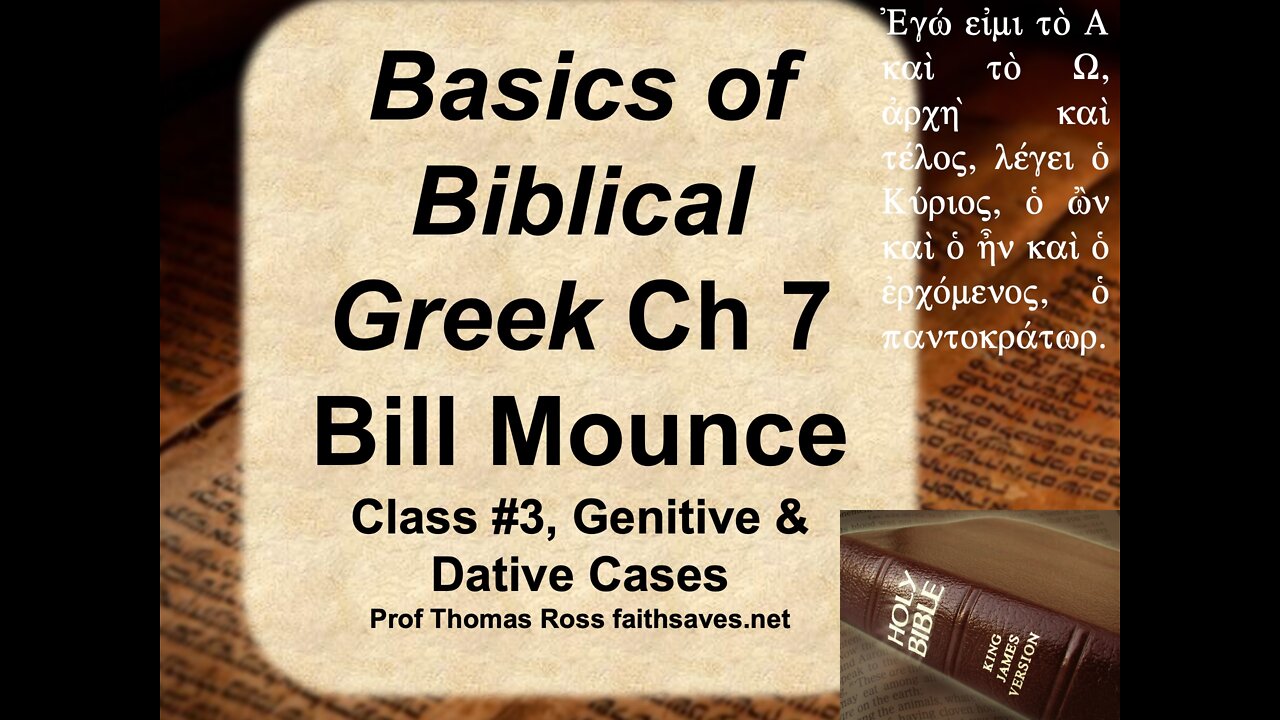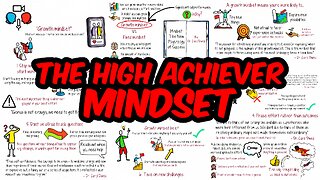Premium Only Content

New Testament / Koine Greek, 1st year, Lecture #3: Basics of Biblical Greek, William Mounce, Chap. 7
Lecture #3 in New Testament or Koine Greek; first year Greek at a college or seminary level taught by independent Baptist professor Thomas Ross.
Learn more about the class at:
https://faithsaves.net/Greek-courses/
Continuing in William Mounce's Basics of Biblical Greek, the professor teaches chapter 7. items covered include the Greek genitive case (omicron upsilon / omega nu), keywords, and case endings; the Greek dative (omega iota subscript / omicron iota sigma), keywords, and case endings; forms of the article, including the rough breath mark or tau followed by case ending tip; genitive specifying possession while dative specifying indirect object; that the genitive tends to follow a head noun and must be treated as a unit; and "of," the genitive key word. The dative key words are "to, in, with," the dative specifies the indirect object. 1st and 2nd declension noun paradigms are examined, along with Basics of Biblical Greek (William Mounce) noun rule #4: "In the dative singular, the iota subscripts if possible"; noun rule #5: "Vowels often change their length ('ablaut')"; and noun rule #6: "In the genitive and dative, the masculine and neuter will always be identical." The partially declined name: ho 'Iesous, "Jesus," is also explained.
Doxa type words (AEIR) are examined--in the genitive and dative singular the ending shifts from alpha to eta. Epsilon, iota, or rho before alpha is like hora, otherwise they are like doxa.
For vocabulary words, the need to memorize the nominative and genitive forms and the article was explained.
Three translation hints from Mounce's BBG were explained: key words (of; to in with) -- check for genitives -- keep possessives with their nouns.
This lecture also provided an introduction to conversational Koine and Halcomb's Speak Koine Greek.
Bill Mounce's Basics of Biblical Greek workbook exercises chapters 5-6 were covered.
The FaithSaves website's section on college courses contains course syllabi, handouts, and other important material for taking this course.
-
 12:42
12:42
Scammer Payback
21 hours agoCalling Scammers who were Raided
3.76K8 -
 23:31
23:31
IsaacButterfield
14 hours agoThe Woke Mob Is Really CANCELLING Matt Rife For THIS…
2.83K7 -
 1:23
1:23
WildCreatures
8 days ago $0.90 earnedThis mother armadillo eating her palm nuts is truly adorable
3.82K10 -
 8:59
8:59
The Art of Improvement
9 hours agoHow to Build the Most Powerful Mindset for Success
2.2K -
 LIVE
LIVE
GritsGG
1 day ago36 Hour Stream! Most Wins 3420+ 🧠
938 watching -
 1:26:16
1:26:16
Michael Franzese
19 hours agoMenendez Brothers Denied Parole – Newsom Holds Their Fate
112K84 -
 2:36:02
2:36:02
I_Came_With_Fire_Podcast
17 hours agoSecret Origins of Transhumanism & The New Atlantis
34.8K17 -
 LIVE
LIVE
sophiesnazz
3 hours ago $0.03 earnedLETS TALK ABOUT BO7 !socials !specs
36 watching -
 3:01:44
3:01:44
MadHouseRetro
4 hours agoPUFFCO PIVIOT BUNDLE GIVEAWAY! and Spider-man 2 playthough!
12.6K1 -
 1:12:40
1:12:40
Wendy Bell Radio
14 hours agoPet Talk With The Pet Doc
67.8K33